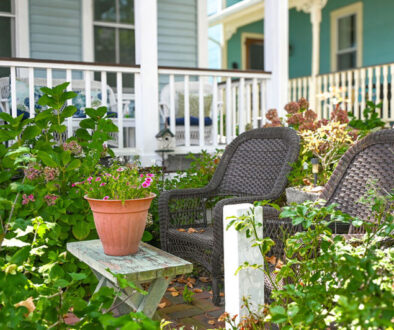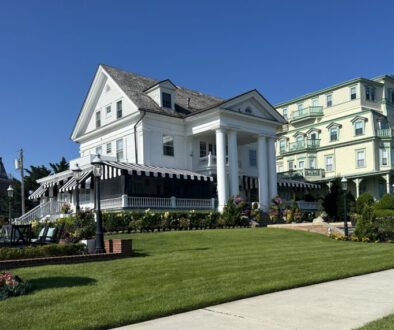Reed’s Organic Farm

For more than a century, members of the Reed family worked a modest farm in rural Atlantic County. In the mid-2010s, the last generation of farmers passed on, and the next generation declined to follow in their footsteps.
The 80-acre tract in Egg Harbor Township might have been sold for development, if not for nick-of-time intervention. Enter Cookie Till.
“I was friendly with the Reed brothers and used to come to the farmstand to buy their corn and tomatoes,” recalls Till, owner of Steve and Cookie’s restaurant in Margate. “I was so worried the farm would end up another subdivision with a hundred houses. I said, ‘Please don’t sell until you talk to me.”
Till had long been involved in programs to promote healthy eating and locally sourced foods. “Fast forward to this farm,” she says, “and I thought, ‘This could be the mother ship.’” She formed a nonprofit, A Meaningful Purpose, to turn the old Reed place into a community hub and model of sustainable agriculture.
In 2020, it reopened to the public as Reed’s Organic Farm. During the pandemic, says Till, “We just wanted to be that oasis for people in a time when we were all struggling.” A trip to Reed’s remains a pleasant retreat from the workaday world.


Visit any day, Thursday through Sunday, and you can shop or dine in a converted pole barn or participate in special events like yoga classes, flea markets, holiday markets, and classes in painting, crafting, and printmaking. It features herbal walks with staff herbalist Leah Martin, the brains behind the farm’s “seed-to-bottle line” of tonics, tinctures, and creams.
The kids will likely make a beeline for the animals pastured out back. The surrendered farm animals include a retired trotting horse named Only, a former racehorse named Kid, two tiny miniature horses, Pia and O’Brien, Violet the donkey, as well as pot-bellied pigs, alpacas, and assorted chickens, ducks, doves, and roosters.
Though the land here has been cultivated since 1907, in many ways this is an all-new enterprise. Reed’s has added dozens of young trees, greenhouses, and outbuildings. It has a new agrarian attitude and big plans for a greener future. Think of it as an experiment in regenerative farming.
Industrial agriculture exhausts the soil by excessive tilling and the use of chemical pesticides and artificial fertilizer. It also contributes to erosion and high levels of atmospheric carbon. Regenerative farming, on the other hand, builds rich soil with little to no plowing and fewer additives. It uses crop rotation, livestock rotation, and composting to create a healthy ecosystem. The practice also reduces erosion and cuts carbon emissions, critical tools in the fight against climate change.


Reed’s wants to lead by example, says Till: “If we can do it, we can show others how to do it.” Staff share these principles through hands-on learning that gives youngsters screen-free time in the great outdoors. It also has a special mission to help young people with cognitive disabilities, offering vocational programs that prepare them to join the workplace. “This was a component from the beginning,” says Till. “And just being in nature is so healing for kids.”
The barn market is a friendly place to pass an hour, with its handsome coffee bar and clubby seating area, where people can plug in and quietly do a little work. The kitchen serves up refreshing grab-and-go lunch items, like old-style Southern grit cakes and sweet and savory galettes. You can also choose from a selection of baked goods, including a wonderfully crumbly blueberry pie.
The market sells a variety of jams, honeys, vinegars, butters, and spreads, along with bunches of wildflowers and of course, fresh-picked produce in season. In late summer, I stocked up on some of the ugliest, most mouth-watering tomatoes ever—real Jersey tomatoes, with that wonderful, heady, grassy smell.
Long-term plans for Reed’s Organic Farm include a “food forest.” Unlike traditional ag fields with their neat crop rows, food forests mimic nature in its seemingly unkempt but marvelously productive wild state, with layers of vegetation—shrubs, herbs, ground cover, and vine and root plants—under canopies of trees, all native to the area. “It is not huge production, but more of an ecosystem,” says Till. “It’s also good for the land.”



She is also interested in alley cropping: planting widely spaced rows of trees with companion crops in-between. This practice, too, reduces surface water runoff and erosion and boosts soil health and fertility. For the first few years, alley crops take some “babysitting,” observes Till. “But if the right trees are in the right place, they start to take care of themselves. That’s our next iteration of the farm, and we’re working with people to get that done. The farm is telling us what it wants to be.”
Lenny Varvero, chairman of the board of A Meaningful Purpose, has called Reed’s “a place where family can come, spend the day with their kids, work in the greenhouses, work with the animals, and learn about farming. It’s going to change lives. It already has changed lives.”
A sign posted in front of a greenhouse sums up the philosophy, with these words from Thoreau: “Plant a seed and be prepared to expect wonders.”



